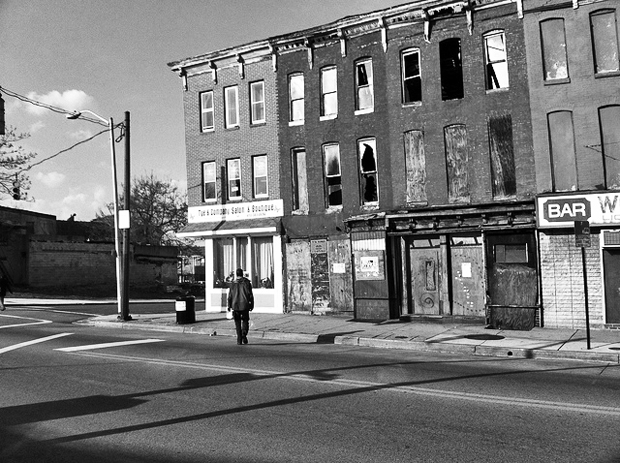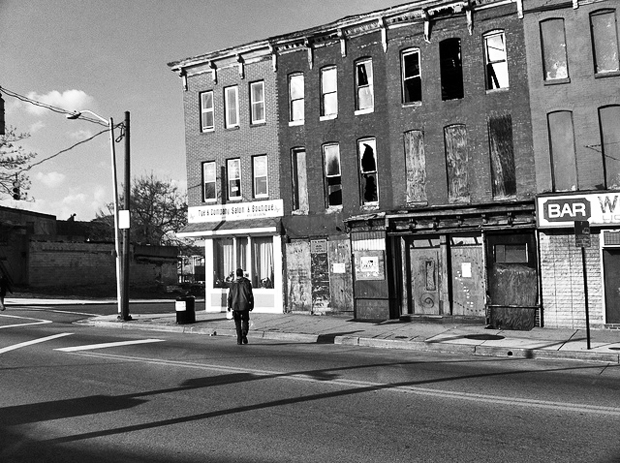 Baltimore in black and white.Photo: Callie NeylanCross-posted from 1934.
Baltimore in black and white.Photo: Callie NeylanCross-posted from 1934.
Yesterday, I read the saddest thing I’ve ever read in my life. In an interview with Bill Moyers, David Simon, creator of “The Wire” — for which he won a MacArthur Genius Award — talks about loving Baltimore and the futility of the drug war. His answer to this question is especially heartbreaking:
Bill Moyers: There’s a scene in the third season of “The Wire” where the Baltimore police major Bunny Colvin, a favorite character, gives some rare straight talk on the futility of this drug war.
David Simon: I don’t think we have the stomach to actually evaluate it.
Bill Moyers: What do you mean?
David Simon: Again, we would have to ask ourselves a lot of hard questions. The people most affected by this are black and brown and poor. It’s the abandoned inner cores of our urban areas. As we said before, economically, we don’t need those people; the American economy doesn’t need them. So as long as they stay in their ghettos and they only kill each other, we’re willing to pay for a police presence to keep them out of our America. And to let them fight over scraps, which is what the drug war, effectively, is. Since we basically have become a market-based culture, that’s what we know, and it’s what’s led us to this sad denouement. I think we’re going to follow market-based logic right to the bitter end.
Bill Moyers: Which says?
David Simon: If you don’t need ’em, why extend yourself? Why seriously assess what you’re doing to your poorest and most vulnerable citizens? There’s no profit to be had in doing anything other than marginalizing them and discarding them.
I’ve lived in Baltimore for more than two years now. I can walk to the neighborhoods that constitute the meeting rooms and the crack houses and the drug corners spawned by this ghetto economy in 10 minutes. I drive through blocks and blocks of boarded-up rowhouses when I take the dogs out for runs. Past half the city’s unemployed black men to whom Simon refers, incarcerated in West Baltimore. Sitting rejected on once-grand marble steps in the middle of the day, the middle of the work week. Shackled to a vast urban wasteland created by centuries of discrimination, failed social policies, and systems design failure on a massive scale.
But I’m white. I live in Bolton Hill, one of those historical covenant neighborhoods that willingly “pays for a police presence to keep them out of our America.” I live on the Maryland Institute College of Art (MICA) campus; my husband, Will, and I call it the “Green Zone.” MICA’s student body is overwhelmingly white and affluent. We have robocops and patrol cars and undercover cops and security guards on the streets of our neighbhorhood 24/7. To keep the rich white kids safe. Because god knows, nothing better happen to those rich, pretty white kids.
But cross North Avenue to the north or Eutaw Place to the west and the police disappear. Instead of foot patrol, a friendly physical police presence, a “Good evening. How are you? Is everything all right?”, people on the “other side” are monitored by blue lights, surveillance cameras mounted on street corners, and a cold, mechanized, “We’re watching you, you urban scum. You’re no good and can’t be trusted. One wrong move and we’ll throw your sorry black ass in jail.” They’re not even worthy of civil, flesh-and-blood human interaction.
It’s uncomfortable. It really bothers me. I struggle with it. I worry. I ponder. I fret. Who am I to care about the poor, black underclass? What do I know about their struggles? Do I, as a white female, have any right to observe and comment? Do pity and guilt constitute racism? Or is it worse to observe and feel nothing? To watch a class of people being thoughtlessly discarded and pretend that nothing’s wrong? Because that’s what most of Baltimore does. One of Will’s friends, a lifetime resident of Baltimore, refuses to watch “The Wire”: “It’s not the Baltimore I know.” Well, of course it isn’t. It’s the Baltimore she’ll never have to know, either. Because she’s white.
I don’t know what to think. I don’t know what to say. I don’t know what to do. And so, I write.
Living in Baltimore has changed me. It inspires me. It challenges me. It disgusts me. Sometimes, it scares me. But it never, ever — not for one minute — bores me. I walk past the city’s “Greatest City in America” benches and scoff. What a joke, I think. This city is a goddamn hellhole. I’m moving back to the West Coast as soon as I get the chance.
But then I think about “The Wire,” its classification as modern day Shakespeare and Dickens, and its proclamation by many to be the greatest show on television. Ever. And I wonder, maybe those benches are right. Maybe it is the greatest city in America. Maybe it has something — a spirit, a smile, a certain je ne sais quoi — that San Francisco or Seattle or New York could never hope to match. Maybe there’s profound beauty in profound failure. Maybe I’m just too close-minded to recognize it. Maybe I’m just too fucking white. For to inspire something so acclaimed and celebrated requires a muse of equal proportions.
Bill Moyers: Are you cynical?
David Simon: I am very cynical about institutions and their willingness to address themselves to reform. I am not cynical when it comes to individuals and people. And I think the reason “The Wire” is watchable, even tolerable, to viewers is that it has great affection for individuals. It’s not misanthropic in any way. It has great affection for those people, particularly when they stand up on their hind legs and say, “I will not lie anymore. I am actually going to fight for what I perceive to be some shard of truth.”
You know, over time, people are going to look at “The Wire” and think, “This was not quite as cynical as we thought it was. This was actually a little bit more journalistic than that. They were being blunt. But it was less mean than we thought it was.” I think, in Baltimore, the initial response to seeing some of this on the air was, “These guys are not fair and they’re mean. And they’re just out to savage us.” But it was a love letter to Baltimore.
I’m not ready to write my own love letter to Baltimore yet, but I am beginning to see why someone did.



